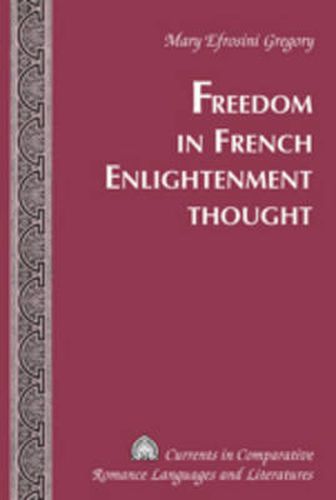Readings Newsletter
Become a Readings Member to make your shopping experience even easier.
Sign in or sign up for free!
You’re not far away from qualifying for FREE standard shipping within Australia
You’ve qualified for FREE standard shipping within Australia
The cart is loading…






This title is printed to order. This book may have been self-published. If so, we cannot guarantee the quality of the content. In the main most books will have gone through the editing process however some may not. We therefore suggest that you be aware of this before ordering this book. If in doubt check either the author or publisher’s details as we are unable to accept any returns unless they are faulty. Please contact us if you have any questions.
Freedom in French Enlightenment Thought examines how five eighteenth-century French theorists - Montesquieu, Diderot, Rousseau, Voltaire, and Condorcet - kindled the flame of freedom in America and France. Each thinker laid down a building block that would eventually inspire the language in constitutions around the world. They held that citizens have certain inalienable rights that are dictated by natural law and endowed to all by our Creator; that these rights include equality before the law, justice, safety and security of persons and property, and freedom of speech, press, assembly, and religion. Montesquieu recommended three separate branches of government that function independently of each other. Diderot held that there is no true sovereign, except the nation; that there is no true legislator, except the people. Rousseau advised that the individual will must be subordinate to the general will and private interest to that of the community: he warned against legislators who act from their own financial interests and enact laws to aggrandize themselves. Voltaire believed that selfishness, greed, and the desire for luxury are not only part of human nature, but that they compel people to achieve, trade with others, search, explore, and invent: the passions are the engine that makes capitalism run and that stimulate all human endeavor. Condorcet, a champion of civil rights, boldly proclaimed equality for women, blacks, and the poor. The philosophes held that free and universal public education will permit more citizens to participate in the progress of the arts and sciences and will improve the standard of living among all strata of society. An unrestrained press permits citizens to make informed decisions. Their polemics have indeed changed the face of the world.
$9.00 standard shipping within Australia
FREE standard shipping within Australia for orders over $100.00
Express & International shipping calculated at checkout
This title is printed to order. This book may have been self-published. If so, we cannot guarantee the quality of the content. In the main most books will have gone through the editing process however some may not. We therefore suggest that you be aware of this before ordering this book. If in doubt check either the author or publisher’s details as we are unable to accept any returns unless they are faulty. Please contact us if you have any questions.
Freedom in French Enlightenment Thought examines how five eighteenth-century French theorists - Montesquieu, Diderot, Rousseau, Voltaire, and Condorcet - kindled the flame of freedom in America and France. Each thinker laid down a building block that would eventually inspire the language in constitutions around the world. They held that citizens have certain inalienable rights that are dictated by natural law and endowed to all by our Creator; that these rights include equality before the law, justice, safety and security of persons and property, and freedom of speech, press, assembly, and religion. Montesquieu recommended three separate branches of government that function independently of each other. Diderot held that there is no true sovereign, except the nation; that there is no true legislator, except the people. Rousseau advised that the individual will must be subordinate to the general will and private interest to that of the community: he warned against legislators who act from their own financial interests and enact laws to aggrandize themselves. Voltaire believed that selfishness, greed, and the desire for luxury are not only part of human nature, but that they compel people to achieve, trade with others, search, explore, and invent: the passions are the engine that makes capitalism run and that stimulate all human endeavor. Condorcet, a champion of civil rights, boldly proclaimed equality for women, blacks, and the poor. The philosophes held that free and universal public education will permit more citizens to participate in the progress of the arts and sciences and will improve the standard of living among all strata of society. An unrestrained press permits citizens to make informed decisions. Their polemics have indeed changed the face of the world.